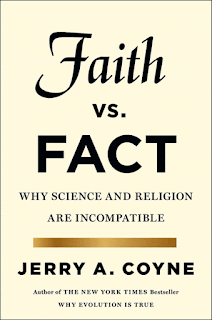Musings on Ultimate Reality, ethics, religion, social history, literature, media, and art
Tuesday, February 21, 2017
Is This True: "Most Scientists Are Non-Religious" According to Jerry Coyne?
Biologist and Atheist Jerry Coyne writes on his science webblog,
"Why else are most scientists nonreligious—far more so than the general public?"
https://whyevolutionistrue.wordpress.com/2017/02/21/ideologically-motivated-teachers-indoctrinate-students-into-thinking-that-science-and-religion-are-compatible/
Caution: Whether or not religion or non-religion, theism or atheism, is true, isn't a popularity contest!
The number of scientists who are or aren't "religious" is only a general indicator of whether or not science and religion are compatible, not whether religion is true or false.
HOWEVER, contrary to atheist Jerry Coyne, according to Pew Research, 51% of scientists aren't atheists.
That means that a majority of scientists are 'religious," not the "most scientists are nonreligious," Coyne's claim.
"According to the poll, just over half of scientists (51%) believe in some form of deity or higher power; specifically, 33% of scientists say they believe in God, while 18% believe in a universal spirit or higher power."
"Finally, the poll of scientists finds that four-in-ten scientists (41%) say they do not believe in God or a higher power."
http://www.pewforum.org/2009/11/05/scientists-and-belief/
That doesn't sound like "most scientists" are "non-religious."
But let's give professor Coyne the benefit of the doubt; maybe his claim was that "most scientists" are not organizationally Christian?
--
Also, consider this study done by Rice University:
"First worldwide survey of religion and science: No, not all scientists are atheists
AMY MCCAIG – DECEMBER 3, 2015
"Are all scientists atheists? Do they believe religion and science can co-exist?"
"These questions and others were addressed in the first worldwide survey of how scientists view religion, released today by researchers at Rice University."
“More than half of scientists in India, Italy, Taiwan and Turkey self-identify as religious,” Ecklund said.
“And it’s striking that approximately twice as many ‘convinced atheists’ exist in the general population of Hong Kong, for example, (55 percent) compared with the scientific community in this region (26 percent).”
“No one today can deny that there is a popular ‘warfare’ framing between science and religion,” said the study’s principal investigator, Elaine Howard Ecklund, founding director of Rice University’s Religion and Public Life Program and the Herbert S. Autrey Chair in Social Sciences. “This is a war of words fueled by scientists, religious people and those in between.”
"The study’s results challenge longstanding assumptions about the science-faith interface. While it is commonly assumed that most scientists are atheists, the global perspective resulting from the study shows that this is simply not the case."
"Elite scientists: 34% Atheist, 30% Agnostic, 36% Religious"
"The researchers did find that scientists are generally less religious than a given general population."
However, there were exceptions to this:
39 percent of scientists in Hong Kong identify as religious compared with 20 percent of the general population of Hong Kong,
and 54 percent of scientists in Taiwan identify as religious compared with 44 percent of the general population of Taiwan."
"Ecklund noted that such patterns challenge longstanding assumptions about the irreligious character of scientists around the world."
"When asked about terms of conflict between religion and science, Ecklund noted that only a minority of scientists in each regional context believe that science and religion are in conflict."
"In the U.K. – one of the most secular countries studied – only 32 percent of scientists characterized the science-faith interface as one of conflict. In the U.S., this number was only 29 percent."
"In addition to the survey’s quantitative findings, the researchers found nuanced views in scientists’ responses during interviews. For example, numerous scientists expressed how religion can provide a “check” in ethically gray areas."
"Ecklund and fellow Rice researchers Kirstin Matthews and Steven Lewis collected information from 9,422 respondents in eight regions around the world: France, Hong Kong, India, Italy, Taiwan, Turkey, the U.K. and the U.S."
"They also traveled to these regions to conduct in-depth interviews with 609 scientists, the largest worldwide survey and interview study ever conducted of the intersection between faith and science."
About Amy McCaig
Amy is a senior media relations specialist in Rice University's Office of Public Affairs.
http://news.rice.edu/2015/12/03/first-worldwide-survey-of-religion-and-science-no-not-all-scientists-are-atheists/
Also, consider this survey's results:
NBCNews
updated 6/23/2005 11:42:26 AM ET
"CHICAGO — A survey examining religion in medicine found that most U.S. doctors believe in God..."
"In the survey of 1,044 doctors nationwide, 76 percent said they believe in God..."
“We were surprised to find that physicians were as religious as they apparently are,” said Dr. Farr Curlin, a researcher at the University of Chicago’s MacLean Center for Clinical Medical Ethics."
http://www.nbcnews.com/id/8318894/ns/health-health_care/t/survey-most-doctors-believe-god-afterlife/
Of course, probably, Coyne would argue that doctors aren't scientists.
But even discounting doctors, it isn't true that "most scientists are nonreligious."
Professor Coyne needs to edit his incorrect claim, or provide contrary evidence.
In the Light of Ultimate Reality, God, Deity, Divine, Essence, the Good, Transcendence, Process, Higher Power, Meaning,
(or whatever other term religious people use to refer to their convincement
that matter and energy aren't the only reality).
Daniel Wilcox
Subscribe to:
Post Comments (Atom)


No comments:
Post a Comment